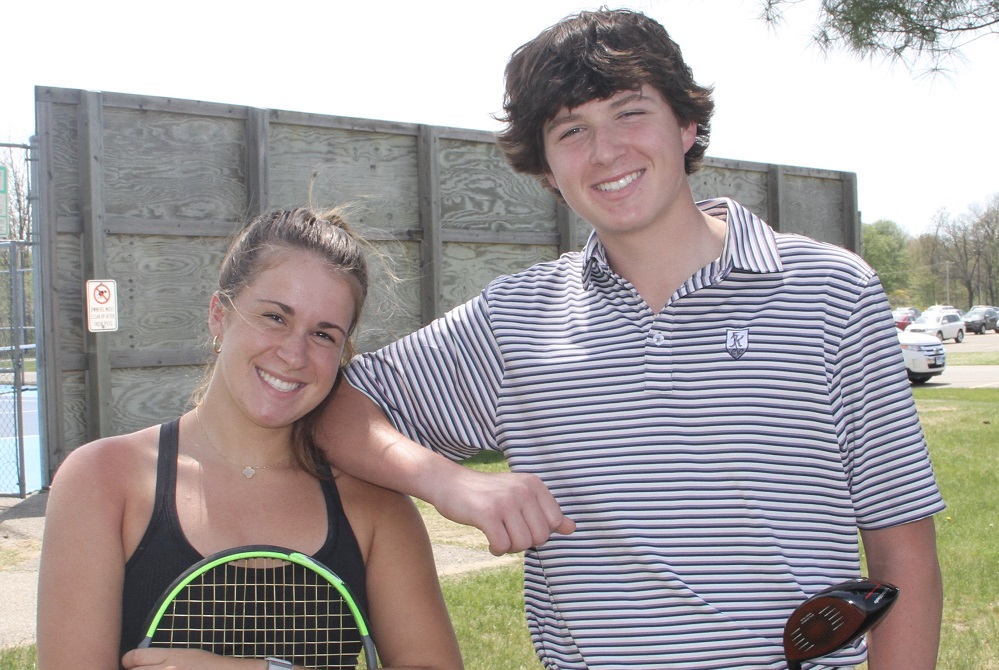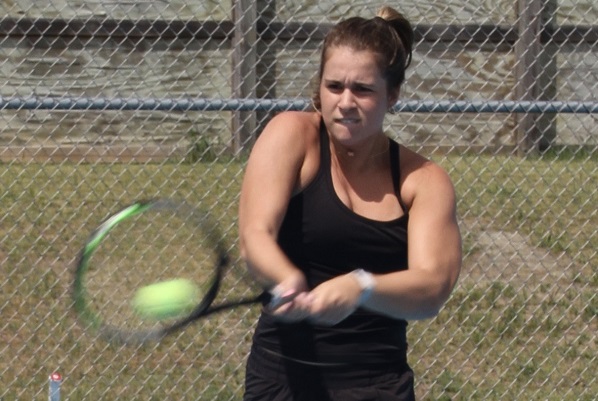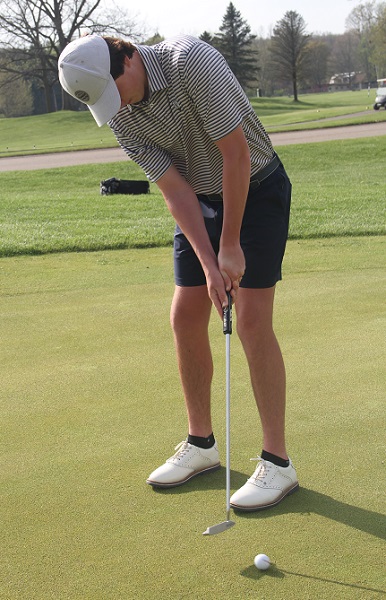
Michigan's Most Vital Prep Sports Moment
April 30, 2018
By Ron Pesch
Special for Second Half
Did you ever hear the one about an Ypsilanti lawyer, two girls from Ann Arbor – one 18 and one 17 – and a judge from Detroit?
I didn’t think so.
Well, pull up a chair. You might never look at a tennis ball, a pair of track cleats, or a softball in the same manner after this one.
Now this story goes back a bit. We’re talking 45, um, make that 46 years ago. It was handed down to me, so now I’m handing it down to you.
The girls, Cindy and Emily, had met at a tennis club when they were 11 or 12. Both were pretty good players who had done well at tennis tournaments before heading off to Huron High School. But there was concern that the girls wouldn’t have the chance to play truly competitive tennis while in high school. You see, like most public schools of the time, Huron had only one varsity tennis team, and that was filled with boys.
Contact was made with a friend and fellow tennis player to help guide things along when it came time to talk to the school board about the girls joining that team.
The conversation between that tennis friend – Larry the Lawyer – and the school board went pretty well. The board decided to let the girls play on the boys tennis team provided they could pass the tryouts. Well, as you’ve probably surmised, the girls did all right. With the blessing of Coach Jerry, it was decided Cindy and Emily would play No. 2 doubles for the River Rats.
 But as we all know, such decisions aren’t always met with cupcakes being served and happiness. People don’t always like change.
But as we all know, such decisions aren’t always met with cupcakes being served and happiness. People don’t always like change.
And that was pretty much the case here.
State officials didn’t much care for the idea. You see, when it came to interscholastic athletics, according to state rules established in 1967, girls couldn’t play on boys teams. Still, the Huron tennis team made the 60-mile trip up to Lansing on a Wednesday in April for a match with Lansing Harry Hill High School. Coach Jerry met with Hill’s coach, they shook hands, then Coach Jerry turned in his line-up card, to make things orderly and official.
Since there were girls names on the lineup card, not a single ball was served that day. Folks figured this was going to be the case. So the players and the bus turned around and headed back to Ann Arbor. Hill claimed a forfeited match because of that rule.
That set wheels in motion. Larry the Lawyer declared that this was a clear case of discrimination and a violation of Cindy and Emily’s right to equal protection under the 14th Amendment. With that, a lawsuit quickly was filed.
Now, they say that this was one of the first, if not the first lawsuits about such things. And you must remember this all happened back in early 1972, before the arrival of Title IX.
Turns out, Larry and the girls won their case. In Federal District Court, Judge Keith listened to what was said and issued a preliminary injunction allowing the girls to play. A little later in the week, Emily and Cindy won their first varsity doubles match hosted in Battle Creek, much to the dismay of their male opponents.
 The next month, the Michigan Legislature adopted a bill allowing girls to compete on male teams, but only in non-contact sports. In late May, the doubles team of Emily and Cindy defeated a doubles team from Harry Hill, 6-3, 6-1.
The next month, the Michigan Legislature adopted a bill allowing girls to compete on male teams, but only in non-contact sports. In late May, the doubles team of Emily and Cindy defeated a doubles team from Harry Hill, 6-3, 6-1.
Of course, as with many of these rulings, there was an appeal. And, as these things usually do, it took a while to move this along. But come January 1973, the U.S. Circuit Court down in Cincinnati agreed with Judge Keith and upheld the preliminary injunction. They, too, thought that girls should be able to participate in varsity interscholastic sports. The Circuit Court did narrow Judge Keith’s decision a bit, inserting the word “NON-CONTACT” into the ruling. Suddenly, it was officially OK for girls to play alongside the boys in sports like tennis, swimming, archery, golf, bowling, fencing, badminton, gymnastics, skiing, and track and field.
Now just because there’s a law, it doesn’t mean everyone’s abiding by it. It would take several more years and the threat or the filing of additional lawsuits against school districts and organizations to truly see things change.
Today, we don’t think twice when we take a seat at a girls softball game, track meet or tennis match. But a short time ago, such things simply did not exist for our daughters. The actions of two girls from Ann Arbor, an Ypsilanti lawyer and a judge from Detroit altered the athletic world – for the better.
 Lawrence Sperling’s lawsuit to support Cindy Morris’ and Emily Barrett’s quest to play high school sports was certainly a highlight of his career as an attorney. Lawrence and his wife Doris had sons who were outstanding tennis players. Michael and Gene were high-ranking players at Ann Arbor Pioneer during the 1970s. Gene played four years of tennis at the University of Minnesota and would later serve as Director of the National Economic Council and Assistant to the President for Economic Policy under Presidents Bill Clinton and Barack Obama. In 2012, he would write about his father and the landmark case for the White House.
Lawrence Sperling’s lawsuit to support Cindy Morris’ and Emily Barrett’s quest to play high school sports was certainly a highlight of his career as an attorney. Lawrence and his wife Doris had sons who were outstanding tennis players. Michael and Gene were high-ranking players at Ann Arbor Pioneer during the 1970s. Gene played four years of tennis at the University of Minnesota and would later serve as Director of the National Economic Council and Assistant to the President for Economic Policy under Presidents Bill Clinton and Barack Obama. In 2012, he would write about his father and the landmark case for the White House.
 Judge Damon Keith had been appointed to the bench of the United States District Court for the Eastern District of Michigan by President Lyndon Baines Johnson, in 1967. It was some four and a half years later that the Morris-Barrett complaint landed on his docket. A graduate of Detroit Northwestern High School, he is the father of three daughters. Keith would later be appointed to the United States Court of Appeals for the Sixth Circuit Court in Cincinnati by President Jimmy Carter in 1977. In 1995, he became the Senior Judge of that court. His amazing story was later told in a documentary “Walk With Me: The Trials of Damon J. Keith.”
Judge Damon Keith had been appointed to the bench of the United States District Court for the Eastern District of Michigan by President Lyndon Baines Johnson, in 1967. It was some four and a half years later that the Morris-Barrett complaint landed on his docket. A graduate of Detroit Northwestern High School, he is the father of three daughters. Keith would later be appointed to the United States Court of Appeals for the Sixth Circuit Court in Cincinnati by President Jimmy Carter in 1977. In 1995, he became the Senior Judge of that court. His amazing story was later told in a documentary “Walk With Me: The Trials of Damon J. Keith.”
According to media reports, Coach Jerry Shull had been trying to get girls eligible for the previous two seasons, but felt the ultimate solution was to have high schools around the state form all-girls varsity teams. He again served as varsity tennis coach in 1973 (of a team that featured 10 females) before stepping aside in 1974.
 Emily Barrett was a multi-sport athlete at Huron High School, competing with the Girls Athletic Club in swimming, field hockey and volleyball as well as tennis during this era of transition. During her senior year, the courts finalized their decision and she again played tennis for Huron. She’d move on to Denison University in Granville, Ohio, after graduation, where she played tennis and field hockey.
Emily Barrett was a multi-sport athlete at Huron High School, competing with the Girls Athletic Club in swimming, field hockey and volleyball as well as tennis during this era of transition. During her senior year, the courts finalized their decision and she again played tennis for Huron. She’d move on to Denison University in Granville, Ohio, after graduation, where she played tennis and field hockey.
A year older than Barrett, Cindy Morris had graduated from Ann Arbor Huron High School by the time the case was finalized. She headed off to the University of Michigan and then transferred to Carleton College in Northfield, Minnesota, where she played No 1. singles and doubles and twice participated in the National Collegiate Women’s Tournament. She later earned her Master’s degree in journalism from Northwestern University. As Cindy Morris, a sports journalist for the Cincinnati Enquirer, she recalled the words of Judge Keith for an article she was writing in late summer of 1978.
“Indeed, no male could have matched (the) soprano cries of joy when Judge Keith said, yes, go out and run and play and win and lose and laugh and cry and feel that special pride of playing for your school that boys in Michigan have always felt but you haven’t.”
The article was about a lawsuit originating in Yellow Springs, Ohio, where a girl was fighting to be allowed to compete in contact sports against boys.
 Ron Pesch has taken an active role in researching the history of MHSAA events since 1985 and began writing for MHSAA Finals programs in 1986, adding additional features and "flashbacks" in 1992. He inherited the title of MHSAA historian from the late Dick Kishpaugh following the 1993-94 school year, and resides in Muskegon. Contact him at [email protected] with ideas for historical articles.
Ron Pesch has taken an active role in researching the history of MHSAA events since 1985 and began writing for MHSAA Finals programs in 1986, adding additional features and "flashbacks" in 1992. He inherited the title of MHSAA historian from the late Dick Kishpaugh following the 1993-94 school year, and resides in Muskegon. Contact him at [email protected] with ideas for historical articles.
PHOTOS: (Top) The first high school match in 1972 for Ann Arbor Huron's Emily Barrett, left, and Cindy Morris was reported on for the Battle Creek Enquirer. (Top middle) The 1972 Ann Arbor Huron varsity tennis team, including Morris and Barrett. (Middle) The Ann Arbor Huron lineup card shows Barrett and Morris' names for a match against Lansing Harry Hill that was not played. (Below) A Lansing State Journal clipping tells of Hill electing to not play the match.

Mattawan's Novaks Claim League Titles, Ready to Pursue Next Championship Goals
By
Pam Shebest
Special for MHSAA.com
May 17, 2022
MATTAWAN — In a family steeped in tennis history, one member is forging his own path.
 Matt Novak has been tearing up the course as Mattawan’s top golfer.
Matt Novak has been tearing up the course as Mattawan’s top golfer.
The sophomore won the individual medalist honor in the 36-hole Southwestern Michigan Athletic Conference Championship two weeks ago and carded the best nine-hole average in SMAC West matches this season.
“He’s having quite a year so far, and we are just very excited to take this ride with him,” Mattawan’s first-year coach Troy Pelak said.
Novak’s sister, Lizzie, is also having a stellar season as the Wildcats’ top tennis player.
She, too, won the SMAC Championship last weekend and, after recovering from an early-season injury, takes a 9-0 record into this week’s Regional.
“Her big win (this year) was vs. Forest Hills Northern (ranked No. 1 in the state in Lower Peninsula Division 2),” said Matt Boven, in his 24th season coaching the Wildcats.
Mattawan tennis is ranked sixth.
As a freshman, Lizzie Novak won the LPD2 Finals No. 2 singles title playing behind her sister, Kate, who is now playing tennis at Bucknell (Pa.) University.
COVID-19 caused Lizzie Novak’s sophomore season to be canceled, and she opted to play USTA tournaments her junior year but hopes to add one more MHSAA title to her resume.
 If she does, she will finish with just one fewer than her dad, David Novak, who won three state titles at Hackett Catholic Central, one at No. 2 singles in 1983 and two at No. 1 singles (1985, 1986).
If she does, she will finish with just one fewer than her dad, David Novak, who won three state titles at Hackett Catholic Central, one at No. 2 singles in 1983 and two at No. 1 singles (1985, 1986).
Matt Novak played tennis at a young age, but “I didn’t like it as much as my sisters did, so I decided to pursue golf more in the summer,” he said.
“I like that you’re really out there by yourself, and you’re playing against the course and not a specific person. You push yourself every single time you’re out there.”
The sophomore also plays hockey during the winter, which has helped his golf game.
“A couple of my coaches taught me how to be a good leader,” he said. “I think I translated a lot of my leader skills from hockey into golf.”
That includes his slap shot which “definitely helps with power off the tee in that long ball,” he said.
Pelak said although Matt is the youngest on the team, he is the team leader.
“We had an event earlier in the year and we took third of 21 teams,” Pelak said. “The team said, ‘This is pretty good,’ and Matt said, ‘Guys, we’re here to win, not place third.’ That’s the message he sent right away.”
Junior Will Kuiper said teammates have a lot of respect for Novak.
“He knows a lot about golf, and he wants to help the team get better,” Kuiper said. “He’ll help you after practice.
“He’ll be hard on us sometimes, but he just wants us to get better. He just wants the team to win.”
That passion for golf sometimes leaves Novak out of family chatter.
“I feel singled out at the dinner table when they’re all talking about their tennis and I’m over here just thinking about golf,” he said, laughing.
His sister agrees.
 “We’ll go full tennis and Matt will go, ‘What about me?’ We’ll try to turn to him, but no one can relate to him as much,” she said.
“We’ll go full tennis and Matt will go, ‘What about me?’ We’ll try to turn to him, but no one can relate to him as much,” she said.
“I think he has the attitude for tennis, but I think it’s kinda fun that he has something different from tennis. Golf is more exciting for him.”
The senior, who is headed to University of Richmond in the fall, is also a team leader.
“I feel I bring a lot of leadership and energy and excitement,” she said. “Some of these players are so much more inexperienced.
“I’m trying to get everyone together on and off the court. I’ve been having a blast. We’ve improved every week, and I hope we can make it to State.”
Tennis suits her, Lizzie Novak said.
“I feel like I’m kind of a control freak,” she said. “I like everything a certain way, and I don’t want someone else to mess up. I can mess up.”
She thanks her sister for steering her to tennis.
“I was obsessed with my sister when I was younger, and she started playing tennis, so that’s what I’ll do,” she said. “She quit dance, I quit dance. It worked, and I love it. It’s just like breathing to me at this point.”
The senior has one more weapon to help her: She’s a lefty which, at times, gives her an advantage since most players are used to facing righties.
“When I play someone left-handed, I’m like, this is terrible, but I like it,” she laughed.
Boven said Lizzie Novak brings power to the team.
“Having a star at No 1 singles puts her other teammates in a position to win,” he said. “It gives other opportunities and actually strengthens other flights.
“To have someone who’s basically a guaranteed point really does a great deal for the team.”
Other seniors on the tennis team are Romika Shokohi, Ashley Goding, Adelaide Douglass and Sloane Lohroff; juniors are Emma Coleman and Madison Pratt. Sophomores are Madison Engel and Kendall Coon, while freshmen are Sienna Watts, Nadia Baird and Emma Pratt.
 Boven said it will be strange not having a Novak on a tennis team next year, but he still has hope.
Boven said it will be strange not having a Novak on a tennis team next year, but he still has hope.
Talking about trying to convince Matt Novak to play tennis, he said, “Absolutely I did, and I’m still trying to talk him into it. I hear he’s a natural, and tennis is in his blood.
“I love his personality. I think he could bring charisma and some talent to the team. So, yes, on a daily basis I’m trying to talk Matthew into playing tennis.”
That may be wishful hoping on Boven’s part.
Novak is totally focused on golf.
“We made it to Regionals but did not qualify for states last year, and I, sadly, didn't qualify (individually),” he said. “(This year) we’re strong, and we have to work on consistency.
“We definitely have a couple guys who can go low. It just matters if we can do it more than once, shoot a good round and the next day shoot a good round again.”
Pelak has six seniors on varsity: Logan McClish, Andrew Keorkunian, Jared Yetter, Zach Sylvester, Seth Reeves and Brady Weller.
Juniors include Blake Welch and Cameron Graver, and the other sophomore is Eason Haller.
Pelak said Novak possesses the qualities of a top golfer.
“In addition to scoring, which is obviously very important in golf, he plays with tremendous poise. His course management skills are off the chart,” Pelak said.
“He does a good job of not getting too high or low and really manages himself on the course with a lot of poise. He’s not emotional, which is perfect for a golfer.”
With two top athletes usually competing on the same day, the Novaks have come up with a plan.
“My mom (Meredith) usually likes to take the tennis and my dad likes golf,” Matt Novak said. “It gets too stressful watching my sister.”
 Pam Shebest served as a sportswriter at the Kalamazoo Gazette from 1985-2009 after 11 years part-time with the Gazette while teaching French and English at White Pigeon High School. She can be reached at [email protected] with story ideas for Calhoun, Kalamazoo and Van Buren counties.
Pam Shebest served as a sportswriter at the Kalamazoo Gazette from 1985-2009 after 11 years part-time with the Gazette while teaching French and English at White Pigeon High School. She can be reached at [email protected] with story ideas for Calhoun, Kalamazoo and Van Buren counties.
PHOTOS (Top) Sister Lizzie and brother Matt Novak are among Mattawan athletes with high aspirations as their sports approach postseason play this spring. (2) From left, Mattawan girls tennis coach Matt Boven, boys golf coach Troy Pelak and golfer Will Kuiper. (3) Lizzie Novak returns a volley during a recent tennis practice. (4) Matt Novak putts during a golf practice. (Boven head shot courtesy of Mattawan’s girls tennis program; all other photos by Pam Shebest.)

